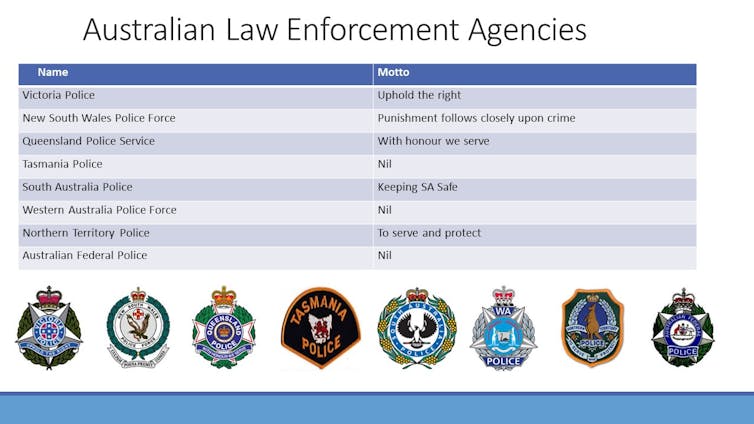When it comes to violent brawls, does Victoria need more 'force'?
- Written by Terry Goldsworthy, Associate Professor in Criminology, Bond University
Early on Sunday morning, a violent brawl erupted on the streets of the inner-Melbourne suburb of Collingwood, injuring six people, including one critically. About 200 people were involved in the brawl, many of them African Australians or of Pacific Islander descent.
Prime Minister Scott Morrison was quick to denounce the violence, implying that Victoria Police was less capable at dealing with violence of this sort than its New South Wales counterpart. He said the then NSW police commissioner, Andrew Scipione, had changed the name of the police service to the police force: “Law and order means something in New South Wales … in my home city, we have a police force that is a force.”
Morrison was suggesting a name change had brought with it a different culture: one that is tougher on and more effective at dealing with the kind of violence seen in Collingwood. But is he right?
Read more: Sudanese heritage youth in Australia are frequently maligned by fear-mongering and racism
What’s in a name?
The NSW Police Service was formed in 1987 with the merging of the NSW Police Force and the NSW Police Department. The NSW Police Service was renamed the NSW Police Force in 2002 under the leadership of the then commissioner, Ken Moroney.
Only NSW and Western Australia use the term “force” in their police agencies’ titles. Other states, such have Queensland, have replaced the word “force” with “service” or just removed the word altogether. This occurred after the Fitzgerald Inquiry into police corruption in Queensland revealed high-level systemic corruption within the police.
The change from force to service was designed to differentiate the new from the old, and to embrace a greater community policing focus in the renewal after the inquiry.
 Australian law enforcement agencies’ names, badges and mottos.
Author
Australian law enforcement agencies’ names, badges and mottos.
Author
So how different are NSW and Victoria in their strategic approach to crime? The NSW Police Force lists its vision as “a safe and secure NSW” and its mission as “the police and the community working together to reduce violence, crime and fear”.
Victoria Police has as its vision “delivering a safer Victoria”. Its mission is to ensure a safe and secure and orderly society by serving the community and the law.
There is no great difference in the underlying strategic ethos of both agencies.
The reality of crime in Victoria
In broad terms NSW crime is at record lows. Bureau of Crime Statistics and Research data show the rate for some crimes has fallen to 40-year lows.
After six years of increases in the crime rate, Victoria last year recorded the largest decline for the past 12 years.
To put these two states in perspective, Queensland’s crime rate has increased for the past three years, including a 2% increase in the overall crime rate for 2016/17.
Crime data supplied by the Crime Statistics Agency Victoria to the author also highlight the issues around crime committed by Sudanese-born Australians.
There is no doubt that Sudanese-born individuals are over-represented in crime data as a percentage of offender population compared to the general population. When it comes to more violent offences such as aggravated robbery and riot, the level of over-presentation increases.
Anetedoctal reports from NSW police suggest they do not have this problem with Sudanese-born people in NSW.
Perceptions matter
Census data from the Australian Bureau of Statistics show that in 2016 Victoria had 8,415 people who identified their place of birth as being Sudan or South Sudan, accounting for 0.14% of the state’s population. NSW had a Sudanese-born population of 6,067, accounting for .08% of the state’s population. So, proportionately, Victoria has more Sudanese-born residents than NSW.
The prime minister also highlighted the perception that, despite NSW having a large Sudanese-born population, it does not suffer the same problems as Victoria. A media focus on the problems of Sudanese-related crime in Victoria might be the cause of this perception.
A search of the Factiva news database using the search term (Sudanese/african/crime) produces 2,251 media documents matching these criteria since 2013 in Australia. In 2013, there were 93; so far in 2018 there have been 998. When considering most mentioned regions, 979 were Victorian, 680 were identified as Melbourne, only 194 were NSW and 181 identified as being Sydney.
Read more: Why the media are to blame for racialising Melbourne's 'African gang' problem
Perceptions of safety are important to police services. Most include annual surveys to measure perceptions of community safety. Victoria Police measures its performance against indicators such as how safe the community feels walking alone and on public transport. Such indicators are included in its annual report.
The 2017 annual report reported substantial declines in perceptions of community safety for the last reported 12-month period across the categories measured.
Victoria Police has an image problem
While crime data would tell us Victoria is becoming a safer place to live, community perceptions do not match this – people feel much less safe. Part of the issue is the critical media focus on the perceived inability of Victoria Police to deal adequately with an easily recognisable offender group. It has all the hallmarks of a moral panic in the making.
Whether Victoria Police is a service or a force is immaterial. Victoria Police needs to improve its messaging and show the public that, as a law enforcement agency, it is a force to be reckoned with.
Reducing crime is only half the battle. Convincing the public that you are in control of crime is the other half.
Authors: Terry Goldsworthy, Associate Professor in Criminology, Bond University
Read more http://theconversation.com/when-it-comes-to-violent-brawls-does-victoria-need-more-force-102642




